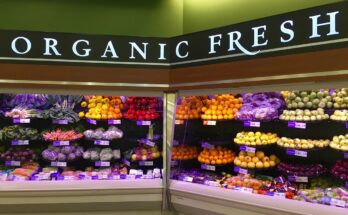Are you aware of the crucial role that efficient supply chains play in the food processing industry?
In today’s fast-paced world, ensuring that food reaches the market safely, on time, and with minimal waste is of paramount importance.
A well-managed supply chain can make all the difference in reducing food waste, ensuring food safety, meeting customer demands, improving quality control, and enhancing overall efficiency.
By streamlining the processes involved in getting food from farm to table, companies can minimize spoilage and maximize profits.
With an efficient supply chain, you can ensure that your customers receive fresh, high-quality products when they need them, resulting in increased customer satisfaction and loyalty.
Moreover, by closely monitoring every step of the production and distribution process, you can maintain the highest standards of food safety and quality control.
So, join us as we delve into the fascinating world of efficient supply chains in food processing and discover how they can revolutionize your business.
Reducing Food Waste
If you want to make a significant impact on reducing food waste, you need to start by understanding the importance of efficient supply chains in food processing. When supply chains are efficient, food can be transported quickly and safely, reducing the risk of spoilage.
This means that fresh produce and perishable items can reach consumers faster, increasing their shelf life and minimizing waste. Additionally, efficient supply chains allow for better inventory management, preventing overstocking and ensuring that food doesn’t go to waste due to expiration.
By optimizing the flow of food from farm to fork, we can significantly reduce the amount of food that ends up in landfills. So, if you truly want to combat food waste, it’s imperative to prioritize and invest in efficient supply chains in food processing.
Ensuring Food Safety
Ensuring the safety of our food is crucial in establishing reliable and trustworthy supply chains in the industry. By implementing stringent safety measures, we can minimize the risk of contamination and protect consumers from potential harm.
From farm to fork, it is essential to maintain proper hygiene practices, including regular cleaning and sanitization of equipment and facilities. Additionally, implementing robust quality control systems and conducting regular inspections can help identify any potential hazards and prevent them from reaching the market.
Adhering to strict regulatory standards and conducting thorough testing for pathogens and contaminants is also imperative. By prioritizing food safety, we can instill confidence in consumers, strengthen our supply chains, and ensure that everyone has access to safe and nutritious food.
Meeting Customer Demands
To effectively meet customer demands, it’s crucial to understand their preferences and deliver products that align with their expectations. In today’s competitive market, customers have become increasingly discerning about the food they consume. They not only want high-quality and safe products, but also expect a wide variety of options to choose from.
This puts pressure on food processors to efficiently manage their supply chains to ensure timely delivery of the right products. By implementing efficient supply chain practices, such as demand forecasting and inventory management, food processors can better respond to customer demands. This includes having the right amount of inventory at the right time, reducing the risk of stockouts or overstocking.
Additionally, effective supply chains enable faster response to changing customer preferences, allowing food processors to stay ahead of the competition and maintain customer satisfaction.
Improving Quality Control
By enhancing the monitoring and inspection processes, you can guarantee that the final products meet the highest standards of quality. Implementing effective quality control measures is crucial in food processing to ensure that the products are safe for consumption and meet customer expectations.

This involves conducting regular inspections throughout the entire supply chain, from sourcing raw materials to packaging and distribution. By closely monitoring each step of the process, you can identify any potential issues or deviations from the desired quality standards and take immediate corrective actions. This not only helps in preventing the release of substandard products into the market but also improves customer satisfaction and brand reputation.
Additionally, efficient quality control practices can minimize the risk of product recalls, legal issues, and financial losses. Therefore, investing in improving quality control is essential for any food processing company to maintain a competitive edge and ensure long-term success.
Enhancing Timeliness and Efficiency
Streamlining and optimizing the production process allows for seamless coordination and swift delivery of high-quality products to meet customer demands. By enhancing timeliness and efficiency, you can ensure that orders are processed and delivered swiftly, reducing the risk of product spoilage or expiration.
Implementing efficient supply chain management practices, such as real-time tracking and automated inventory management systems, enables you to monitor the status of products throughout the entire production and delivery process. This allows for quick identification of any bottlenecks or delays, facilitating prompt resolution and minimizing disruptions.
Additionally, investing in advanced technology and equipment, like automated packaging and labeling systems, can significantly improve production speed and accuracy. By enhancing timeliness and efficiency in your supply chain, you can keep up with customer demands and gain a competitive edge in the food processing industry.
Conclusion
In conclusion, you should prioritize efficient supply chains in food processing to address various challenges. By reducing food waste and ensuring food safety, you can meet customer demands and improve quality control. Additionally, enhancing timeliness and efficiency will maximize productivity and profitability. By implementing efficient supply chains, you will not only minimize costs but also enhance customer satisfaction, maintain product quality, and stay competitive in the market.
So, make sure to focus on optimizing your supply chain processes for a successful food processing business.




